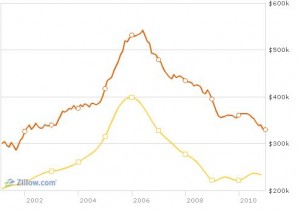Yesterday the Huffington Post published an excellent follow-up article about strategic default: Learning To Walk: Fear, Shame And Your Underwater Mortgage. In this post the reporters followed up with 48 of the 58 families who were considering walking away from their underwater homes in January of 2010. Seems a lot of people are singing that old The Clash song, Should I stay or should I go?
If I go, there will be trouble.
Many homeowners interviewed felt a moral obligation to continue to pay their mortgage. Some drained their savings; including the raiding of their retirement accounts to keep the mortgage fed. This housing market has many homeowners trapped. In Florida 46% of the homes with mortgages are underwater – making it very difficult for people to move for better job opportunities, to upsize to accommodate a growing family, or downsize due to divorce or the empty nest.
Some of this moral commitment has faded in the face of situations that seem hopeless. Strategically defaulting (not making the payments even when you can afford to) on mortgages to force the bank to accept a short-sale is happening with increasing frequency. The article states, “Data suggest that wealthier Americans, not those with lower or mid-range incomes, have a greater proclivity for punting their mortgage obligations by embracing strategic defaults.” It goes on to list the multiple occasions where commercial entities, indeed the mortgage companies themselves, have walked away from commercial mortgage obligations.
The questions to be answered are: “When will the market recover?” and “How bad will a default damage my credit?”
When will the housing market that I am in recover?
A randomly chosen Sarasota, Florida Zillow listing clearly shows a 38% increase in market value in the short 24 months between July 2004 and July of 2006. Fifty-six months later, it has lost all that gain and then some. There are no strong signs of recovery and this home is now valued very close to its 2002 price.
Even long time homeowners who did not buy at the top have been hurt. If this home had appreciated at just the rate of inflation since 2002, it would be worth $76,000 more than its current value. People who were depending on the appreciation of their home to fund a large piece of their retirement might have to wait quite a while to recover even modest gains.
How much does a default affect your credit?
Because the FICO formula is secret, there is no way to accurately calculate the affects of different default routes. It is generally advised that a foreclosure has the most damaging affect on your score, followed by a deed in-lieu, and then a short-sale. Generally, a bank will report every month you are delinquent and each report pushes your score down – a deed in-lieu may do less damage than a foreclosure because it happens faster.
And if I stay, it will be double.
Strapping yourself to the deck of a sinking ship never makes sense. If there is a way to right the ship – DO IT! Work like crazy to get and stay caught up. But, you MUST do a honest and thorough evaluation of the situation. If you continue on the same trajectory, where will you be in 6 months – 12 months – 48 months? What do you think is going to change? Are your expectations realistic? You need find someone intelligent, who is not emotionally invested, to review the hard numbers with you.
Should I cool it or should I blow?
In the end, make a reasonable decision based on what is best for your family and quit listening to judgmental people who have neither been there nor done that.
